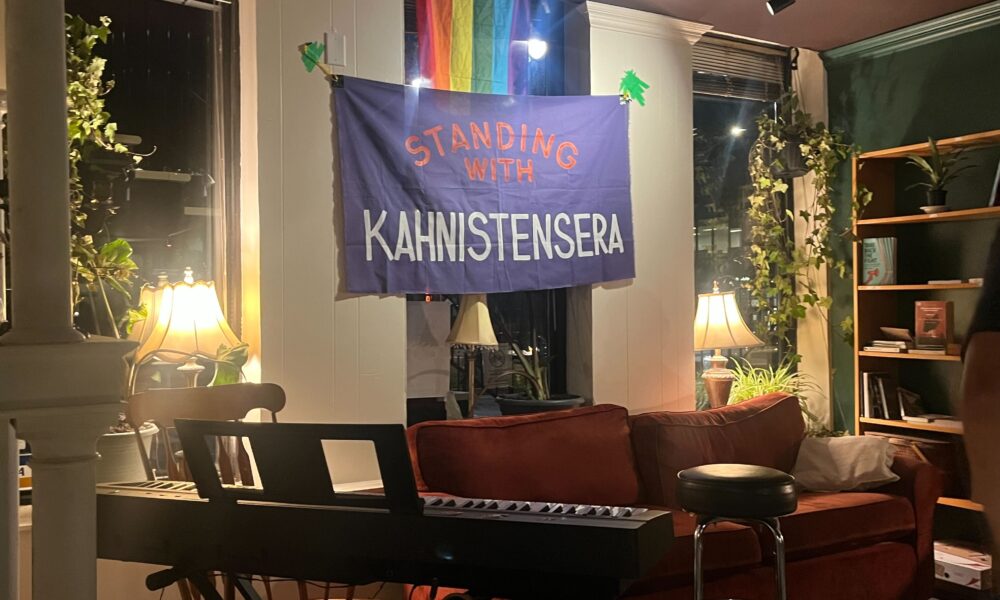Singers, poets, visual artists, and members of the broader Montreal community gathered at Bar Milton Parc on Sept. 12 for a fundraising art showcase in support of the Kanien’kehá:ka Kahnistensera (Mohawk Mothers), who are currently involved in an ongoing lawsuit with McGill and investigation into possible unmarked graves on the site of McGill’s New Vic Project. The event was hosted by Suppart, a collective of eight organizers who host weekly showcases with local artists to fundraise for various causes.
Suppart is a non-hierarchical, consensus-based organization, whose mission is to champion young artists and promote social change. In addition to the Mohawk Mothers, the group is fundraising for the International Solidarity Movement, the Palestine Children’s Relief Fund, and Comm-Un. Suppart founder Maddy Hay told The Tribune that she sees community-building as the key to fostering social change.
“The dream was to create a consistent safe space where young artists and friends could come together to support each other and the causes,” Hay said.
Suppart began fundraising for the Mohawk Mothers this summer. Since 2015, the Mohawk Mothers have been working to prevent construction at the former site of the Royal Victoria Hospital (RVH), where McGill seeks to build their New Vic Project. On the site, the CIA and Canadian government ran the MK-ULTRA mind control and chemical interrogation experiments from the 1950s to the 1960s, which allegedly disproportionately targeted Indigenous youth. The Mothers believe there may be unmarked graves at the site and have been advocating for a comprehensive investigation.
In April 2023, the Mohawk Mothers reached a settlement agreement with McGill, the Société québécoise des infrastructures, the RVH, the City of Montreal, and the Attorney General of Canada, which mandated that a panel of archaeologists appointed by all parties support archival, testimonial investigations, and archeological work at the site. However, after the panel disbanded in August 2023, various hearings have ultimately left the panel dissolved. In the latest decision on Aug. 17, the Court of Appeal of Quebec ruled that the panel would not be re-established as the Superior Court of Quebec had ruled in November 2023.
In a written statement to The Tribune, the McGill Media Relations Office (MRO) highlighted that, although the panel would not be re-established to direct excavation work on the site, the recommendations the panel made in their July 2023 final report remain in force. Moreover, the MRO noted that, as per the panel’s recommendation, an archaeologist will monitor excavation on McGill’s section of the site in the fall of 2025, when excavation work is scheduled to begin.
Karonhia’no:ron, who performed poetry at the event, is a McGill graduate student who joined Suppart through their work with the Mohawk Mothers. Karonhia’no:ron explained that the latest ruling represents a loss for the Mothers and spoke to the importance of fundraising for them in the wake of the decision.
“The funds are important […] because the Mothers are not represented by lawyers. So whenever there is a decision in favour of McGill or Quebec, it’s at the cost of the Mothers,” Karonhia’no:ron said.
Karonhia’no:ron also noted that, in addition to raising money, the showcases they host aim to promote social change and awareness through community building.
“It’s a great way to not just have more people know about the Mothers, but have more people that know each other and support each other,” Karonhia’no:ron said.
Poet Robin Warren—who goes by the stage name Rusty—performed at the event and echoed Karonhia’no:ron’s sentiment, stressing the sociopolitical power of art.
“One of the things that interests me about Suppart is that they blend art and activism together,” Warren said. “Art has always been at the forefront of political action [.…] [When you] start listening to other people that write, you can feel their hurt, you can know what they’re hurting about, and you can better understand [their] issues.”
A previous version of this article stated that the CIA and Canadian government ran MK-ULTRA experiments on the site of the former Royal Victoria Hospital from the 1950s to the 1970s. In fact, the experiments ran between the 1950s and the 1960s. The Tribune regrets this error.







